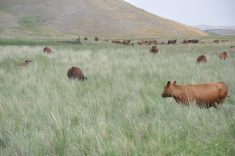Western Producer staff
The federal agriculture minister is inviting every farmer to move beyond coffee row’s square tables and contribute to round-table discussions. Although it’s the busiest time of year for most farmers, circle Sept. 29 on the kitchen calendar – that’s the deadline for submissions from people to share their views on the future of the agri-food economy, prior to round-table discussions this fall.
In an advertising campaign, the agriculture department posed three questions seeking input from farmers, the agri-food industry, the business community, academics, governments and individuals.
Read Also

Late season rainfall creates concern about Prairie crop quality
Praying for rain is being replaced with the hope that rain can stop for harvest. Rainfall in July and early August has been much greater than normal.
It’s crucial for farmers to become involved at this stage, rather than later be forced to react to the visions of others who have decided the future of agriculture.
People are asked to offer written submissions to the following: what key opportunities do you see for the agri-food sector over the next five to 10 years? What impediments could prevent the sector from taking maximum advantage of these opportunities? What is the role of governments, the private sector and farmers in overcoming impediments and capitalizing on the opportunities?
It’s ironic the questions appear after some of the most critical changes in the history of agriculture and transportation in Canada.
The impediments to opportunities in the agri-food sector are often beyond the control of Canadians. International trade deals signed within the last decade, and the ridiculous challenges launched by ambitious foreign politicians in the deals’ aftermath, will continue to restrict opportunities.
As for the role of government, it’s a foregone conclusion that the right answers will be those favoring the direction federal and provincial governments have been going – less commitment, less involvement, less money.
Even without the above pessimism, there must be skepticism from farmers, understandably, about the whole round-table process. How many times have they been queried before for their input? Did they really influence the government’s direction? Or did they vanish with the appearance of a new government at election time?
Farmers should ask at what expense these round tables are appearing, and what commitment there is from the government to follow through later.
If farmers have faith in the government, then they are urged to pick up their pens or computer keyboards and send in their thoughts before the round-table meetings to be held in the Prairies.
At the least, ask to see the summaries that others have submitted. Ten years can be an awfully long time to live under someone else’s agri-food regime.
















